旅游专业英语教案17Task 7 Sightseeing(part two)
87 Sightseeing 观光
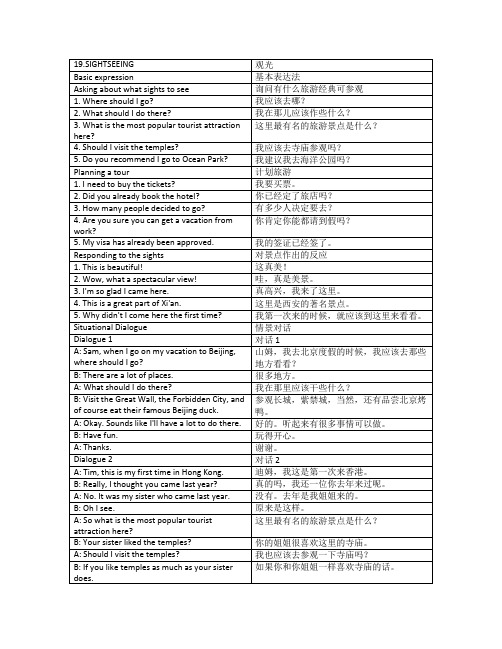
14. The best way to go sightseeing is usually alone so that you can enjoy all the views without people rushing you.
观光最好是一个人去,这样你就可以好好欣赏景致,没有人会催促你了。
我更喜欢去那些人不是太多的地方,体验那里的风土人情,而不是去那些著名的景点。
8. There are places in this world that are known for their breath taking beauty in nature.
有些地方因其令人惊叹的自然美景而闻名。
9. The sky in Tibet is blue and the clouds are puffy and white.
我喜欢旅游,到美丽的风景区摄影。
2. It is a good idea to ask people where you should go before you attempt to visit the places.
你要去某个地方旅游之前,最好先问问别人,你该去那些景点看看。
3. Some places are a must while others can be left out.
我第一次来的时候,就应该到这来看看。
B: I don't know, but we need to come again sometime.
我不知道(行不行),但我们应该什么时候再来这里看看。
A: That's for sure!
那是一定要的。
Complex expressions
《旅游英语视听说》Chapter 17 (1)

Based on the above passage, decide whether the following statements are true or false. Write T for true and F for false.
1.__T___Fashion world lives on big brands.
5. In Part Four, through listening to the dialogue, you’ll learn how to buy some eye-shadows.
6. In Part Five, you’ll get a chance to expand your knowledge with interesting types of exercises, including: (1) Readings: How to Use Cosmetics?(2)story-retelling: Make-up Examination
There are many theories on how to__se_l_e_c_t _ your colors. Now there are two tones: cool or _w__a_rm__depending on our complexion.
If you have trouble finding the best colors for you, here are the secrets to make the choice. First pick a celebrity that looks _s_i_m_i_la_r to
Useful Words and Expressions
旅游英语sightseeing

Role Play
Situation 1: Harry couldn’t find one of his bags when he was showed to his room. He is very anxious and then asking the tour guide for help.
Listening Practice
The first scenic spot The second scenic spot The third scenic spot Specials of the Grand View garden The place that guests have their
lunch The time that guests set off
Dialogue Study
P145—146 Dialogue 1 Dialogue 2
Role Play
Situation 1: Barbara is an American, Now she is talking to a travel agent on the phone to get information about the packaged in the city.
What are the procedures of handling guest’s complaints?
Watch Video
Questions: 1. What are they
talking about ? 2. How was John’s
vacation? Why?
Key Words Study
like.
Emergency
We will page your son throughout the park right now.
旅游专业英语(第四版)第一章教案 (2)[4页]
![旅游专业英语(第四版)第一章教案 (2)[4页]](https://img.taocdn.com/s3/m/3edb275526284b73f242336c1eb91a37f011324b.png)
Step 2: Situational dialogue
1)Teacher’s explanations about the vocabulary, short expressions and sentence structures
1.独立完成课前任务
2.小组合作完成情景对话角色扮演
3.用所学阅读语料的知识用英语向班级同学流利展示中国文化精髓并模拟导游工作场景设置英文问答等互动环节
了解机场服务(机舱内服务)英语技能、通晓中国饮食文化之英语表达
四、教学反思
不足
学生对机场工作场景不熟悉,缺乏真实的工作体验感。
改进策略
1.根据实际课时和学生学习实际情况,开发模拟导游实训室或实训基地,加强学生对岗位的认知和体验,让所学知识能活学活用。2.引导学生尽快适应高职英语学习模式。
处理方法
通过学习相关词汇和句型,帮助学生掌握此工作任务涉及到的口头和书面英语表达,然后通过角色扮演和演讲等活动巩固所学的内容。
二、教学策略
设计理念
教学方法与手段
教学评价
采用小组塔式多维度评价学生学习成效。破除了唯分数评价学生的传统评价模式。采用小组塔式式管理评价模式能更加客观、全面地评价学生的学习表现,提高学生参与课堂、小组活动的主动性和积极性。
《旅游专业英语》教案(1-3课时)
一、教学分析
授课信息
课程名称
旅游英语
授课对象
旅游管理、涉外旅游管理
教学章节名称
Chapter I Englishi at Airport
教学单元
Unit 3 On the Plane
旅游英语课件Unit 7 Sightseeing

Text A Four Seasons in Mt. Huangshan
Background Information: 5. 世界文化遗产 中国有二十九处世界文化遗产,分别为:明清故 宫、颐和园、天坛、长城、周口店“北京人“遗址、 承德避暑山庄及周围寺庙、平遥古城、曲阜孔庙孔林 孔府、敦煌莫高窟、大足石刻、秦始皇陵、苏州古曲 园林、武当山古建筑群、拉萨布达拉宫、丽江古城、 泰山、黄山、峨眉山-乐山大佛风景名胜区、九寨沟 风景名胜区、黄龙风景名胜区、武陵源风景名胜区、 庐山风景名胜区和武夷山风景名胜区。
that Phuket had many troops. Finally the Burmese retreated due to starvation. The two women became local heroines. They received the honorary titles, Thao Thep Kasatri and Thao Sri sunthon from King Rama I.The shape of the symbol is a circle and the circle is surrounded by ka – nok line that shows the bravery of leaders in Phuket province.
Text A Four Seasons in Mt. Huangshan
Background Information: 4. 黄山三大主峰 黄山1000米以上的山峰共有77个,其中命名的 有72个山峰(36大峰,36小峰)。黄山三大主峰都在 1800米以上:瑰丽高峰——莲花峰,海拔1864米。 平旷高峰——光明顶,海拔1860米。险峻高峰——天 都峰,海拔1810米。
教案 Chapter 8 Sightseeing[3页]
![教案 Chapter 8 Sightseeing[3页]](https://img.taocdn.com/s3/m/1d211a82a98271fe900ef913.png)
Chapter 8 SightseeingPart One RevisionI. Review the important phrases in Chapter 7.II. Let the students make short conversations and check their communicative ability. Part Two Teaching PointsI. Important point: master words and phrases related to sightseeing.II. Difficult point: learn the detailed information of sightseeing and related communicative skills.Part Three: ContentI. Lead in1. Give a brief introduction about sightseeing.2. Inform the students of teaching objectives.3. Provide some related background information of sightseeing.II. Situational DialoguesTake dialogue one for example.Dialogue OneMan : So, what do you want to do tomorrow?Woman: Well, let's look at this city guide here. Okay, uh, here's something interesting.Oh! Why don't we first visit the art museum in the morning?Man : Okay. I like that idea. And where do you want to have lunch?Woman: How about going to an Indian restaurant? Hum... The guide recommends one downtown a few blocks from the museum.Man : That sounds great. After that, what do you think about visiting the zoo? Oh . .umm . . well . . . Well, it says here that there are some very unique animalsnot found anywhere else.Woman: Well, to tell you the truth, I'm not really interested in going there.Man :Really?Woman: Yeah. Why don't we go shopping instead? There are supposed to be some really nice places to pick up souvenirs.Man : Nah, I don't think that's a good idea. We only have few traveler’s checks left, and I only have fifty dollars left in cash.Woman: No problem. We can use your credit card to pay for my new clothes.Man : Oh, no. I remember the last time you used my credit card for your purchases. Woman: Oh, well. Let's take the subway down to the seashore and walk along the beach.Man : Now that sounds like a wonderful plan.III. Vocabulary & Useful expression1. Useful Wordstourist information 观光服务处one-day trip 一日游tourist spot 观光胜地half-day trip 半日游famous spot 名胜historic site 古迹zoo 动物园botanical garden 植物园China National Tourism Administration 中国国家旅游局international travel service 国际旅行社tourism company 旅游公司spring outing 春游autumn outing/fall excursion 秋游2. Useful Expressions1)Access all day.全天开放2)Admission is free.不收门票3)Advanced booking is essential to avoid disappointment.提前预定,避免错过4)Child reductions.儿童优惠5)Concessions.(票价)优惠IV. Reading MaterialsPassage TwoIf you have ever dreamt of travelling by camel through golden deserts or wandering through mysterious ancient cities, then the chance may now be open to you.On October 15, China agreed to the opening of tourist routes to Jordan in western Asia. So, we can find lots of ancient buildings of Petra in Jordan. The country has one of the Middle East's greatest historical and architectural treasures——the ancient rose-colored city of Petra. Located deep within a narrow desert gorge, Petra's most striking sights are the towering temples carved into the cliff faces. They are unlike anything you have ever seen. The unique scenery attracted the attention of Hollywood filmmakers, who shot one of the "Indiana Jones" films at the ancient site.V. Knowledge Expansion国外观光旅游常见警示牌与标志汇总(Notices and Signs)请自备零钱Exact Fare Only请往里面走Do Not Block禁烟No Smoking请系安全带Fasten Seat Belts入口Entrance出口Exit/Way Out付费处Cashier行李保管处Cloakroom男厕所Gentlemen/Men女厕所Ladies/Women闲人免进Employees Only请勿打扰Do Not DisturbPart Four: ConsolidationOrganize the students and let them make oral-play carefully, make sure they learn the related phrases and communication skills in sightseeing.Part Five: AssignmentCheck the skill training in this unit.。
《旅游英语视听说》Chapter 17 (2)

important to make your bonfire _m__e_m__o_ra_b_l_e_ and enjoyable.
Part Four: Be Interesting to Speak
that is obscure and somewhat _s_ec_r_e_t_iv_e. There are a couple of
different outdoor areas that would probably be better choices than
others. Ab_e_a_c_h_ is the best location to have a bonfire, especially one by a small pond. The s_e_c_o_n_d best is in a sats
1. At very beginning, you will learn some useful words and phrases.
2. In Part One, you will learn some informative and important tourism knowledge. 3. In Part Two, through watching the video, you’ll learn how to politely handle guests whom you don’t expect to come at your parties .
Step 3: Split the portions. If dinner is a serve yourself affair, then the extra guest is easy to accommodate-----simply adjust the portions accordingly. However, if you have prepared six portions of chicken----not seven----then you have no alternative but to split delightful niece Tara’s portion with her surprise partner. Politely excuse this when serving up. "I'm terribly sorry, I only cooked for six, but I know Tara won't mind sharing." Step 4: Speak to offender afterwards. When dealt with in a polite and dignified manner, your surprise guest should pose little problem once dinner is under way. Relax and enjoy the evening. Either in private or after the event you are perfectly entitled to make your delightful niece realize that her actions were completely unacceptable.
旅游英语教案完整版

旅游英语教案集团标准化办公室:[VV986T-J682P28-JP266L8-68PNN]Unit OneA. ObjectivesStudents will be able to:1)Be familiar with the expression used in airport2)Describe a scenic spot;3)Learn how to write a reservation application formB. Important and difficult points1) Speaking skills: make a dialogue about greeting guests2)Comprehensive skills: Understand the passage in the text and on this basis, learn to describe content of the text, and discuss about the issue.3) Functions:Focus 1: how to write an formFocus 2: how to make a welcome speechC. teaching contents and time allotment:1st -2nd period: warming up and background information, comprehensive reading of Part 1, explain new words, and phrases and expressions.3rd -4th period: understand samples in Part 2, and discuss, explain new words, phrases and expressions.5th--6th period: Do the listening. Check the answers of excises on page 5-6. Make a welcome speechD. Teaching ProceduresSix teaching periods are needed to cover the whole unit, among which students will have a series of reading, listening, speaking and writing activities related to the theme of the unit.1. Period One and Period Two:Step one: warming up.Step two: let students do the fast reading to find out thebasic structureStep three: do the global reading and then answer thequestions on Task 1.Step four: intensive reading. Explain the important words,phrases, expressions and sentences with some examples.Step five: complete the exercises in Page 3-62. Period three and Period four:Step one: warming up.Talk about tours in summer vacationStep two: skimming reading and find the answers for thequestions on Task2.Step three: read the samples again to get the key informationsStep four: intensive reading, understanding the importantwords, phrases, expressions and sentences with some examples. 3. Period five and Period six:Step one: Do the listening.Step two: complete the exercises in Page 3-6Step three: make a speeche based on Task 4Notes:Important words: scenic:affiliate n附属机构;会员;equalize v使…相等;forum?n 论坛;heritage n遗产;impact n冲击,影响; Incentive n鼓励,刺激;infrastructure n基础设施;know-how技能,实际知识,本事;outstripping a超过的;revenue n. 收益,收入Phrases:group visa团队签证; Consulate genera总领事馆;China entry cards中国入境登记卡I can not find my other checked luggage我找不到托运的另一件行李。
Unit 7 Sightseeing
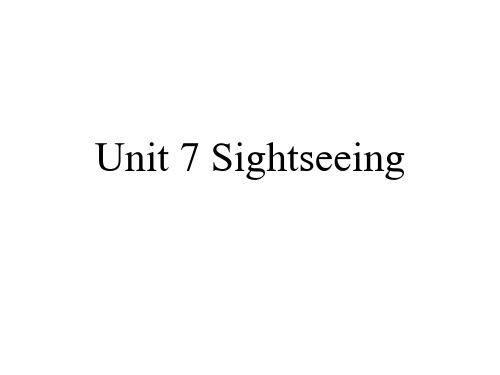
Section A Related Special Terms
Tourism
• • • • • • • • • tourist trade tourist season off season peak season shoulder season eco-tourism national eco-park national geo-park game sanctuary • • • • • safari park botanical garden holiday villa medical spring eco-agricultural garden for tourism • state-listed famous historic and cultural cities • seaside sanitarium • mountain resort
remember to give free time to tourists in the attractions. Allowing people time and space on their own creates the opportunity for amore lasting personal experience. Tour guides also must deal with occasional emergencies and make snap decisions. As a local guide, he/she should know the location of a hospital in any region where the tour travels. Warn tourists of danger whenever necessary.
旅游英语教学参考7--Task7Sightseeing

旅游英语教学参考7--Task7SightseeingTask 7 SightseeingMain video:人物:Janet Jin – local guide,Daniel Black-group leader场景(解说):Janet Jin will lead her tour group to the first destination–Tian’anmen Square镜头一:酒店的停车场,一辆游车旁边,Janet Jin正在提醒游客们带上房卡,记住酒店前台的电话号码和酒店的地址,并建议他们带上遮阳伞防晒。
Janet Jin: Attention please! Before starting, please make sure you’ve brought your key cards, do remember the phone number of the front desk is 010-********, the hotel is at No. 19, Dawang Road, Chaoyang district. Also, you’d better bring your umbrellas to protect yourselves from the burning sun.镜头二:游车缓缓启动,车内,Janet Jin正向游客们交代一天的活动安排。
Janet Jin: Good morning, friends. I will reconfirm the itinerary for today. Firstly we’ll go to Tian’anmen Square, then, move on to the "Forbidden City". We’ll have lunch at 12:00 in Dongsheng Restaurant. After lunch, we’ll visit the Temple of Heaven. Dinnertime is at 18:30 in the evening, at Laojiefang Restaurant. Then we’ll go back to the hotel. Now, we’re leaving for Tian’anmen Square.镜头三:游车前行中,Janet正向游客简介天安门广场、紫禁城和天坛。
《旅游英语视听说》Chapter 7 (2)
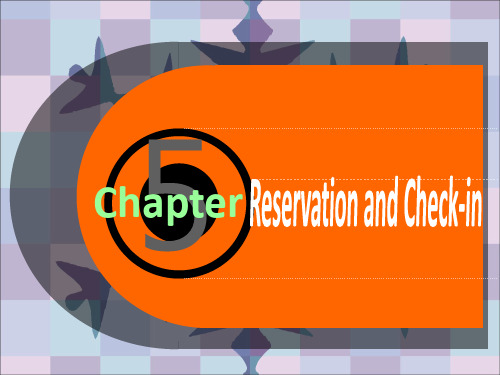
3)Being knowledgeable about the checking-out times, hotel services and local attractions is essential. But even more important, are personal warmth, friendliness, and good people skills. 4)When travelers reach their hotel, they are often tired or stressed. The desk clerk’s job is to make them feel truly welcomed and comfortable. So they will make a point of staying at your hotel every time when they are in town. 5)The front desk is an excellent place to start if you are interested in career of hotel management since it allows you to learn about the many different aspects involving in running a hotel efficiently and places you on the front line of customer relations.
following statements are true or false. Write T for true and F for false.
• 1.__F___ Front desk is different from reservation
Chapter 7 sightseeing 教案

旅游英语课程教案单元课题:Chapter 7 Sightseeing课时:2 时间:2013年11月13日星期三教室:1-613单元授课方式及手段(Teaching Methods):Lecturing; Discussion; Role-play; Multimedia Teaching单元教学目标(Teaching Objectives):1.Acquire knowledge about★words, expressions and sentences used to interpret a scenic spot2.Acquire ability of★interpret a scenic spot in English单元教学重难点(Focal Points ﹠Difficult Points)Focal Pointsmaster the language used for interpreting a scenic spotDifficult Pointsmaster the language used for interpreting a scenic spot教学过程与内容(Teaching Procedures and Content):(第一节课)Step 1 RevisionReview the English names of some sightseeing.大东海大小洞天旅游区鹿回头公园亚龙湾五公祠假日海滩博鳌亚洲论坛兴隆热带植物园Luhuitou Park Dadong Sea Five Officials TempleYalong Bay Holiday Beach Boao Forum for AsiaDaxiao –Dongtian Scenic Spot Xinglong Tropical Botanic GardenStep 2 ExplanationAs a tour guide, you need to introduce the scenic spots when visiting them. But how to introduce the scenic spots while sightseeing ? This is what we are going to learn today. Now we are going to see an example of narration of Xinglong Tropical Botanic Garden. Please turn to page 102. See Task 7, please.1.Listen to the passage, fill in the missing information you heard.Good afternoon, ladies and gentlemen!Welcome to Xinglong Tropical Botanical Garden.Xinglong Tropical Botanical Garden consists of mountains, countless hills, hillsides, man-made lakes, ditches and lowlands, all of which cover more than 400(1) hectares.There are thousands of kinds of flora, with 340 thousand plants and 25 thousand valuable tropical fruit trees, forming an ecological agriculture project. Please follow me (2).Most of the flowers are tropical ones. Now, I will introduce an interesting flower (3) to you. Please look at this colored leaf. It has a local name “older and nicer”, because the older the leaves, the brighter th e color.Come this way (4). Please look at the flowers on the branch inlaid with coconut shells. It is a tropical burn.Isn’t it beautiful? It tends to arouse people’s hope for life.Do you know about these fruit trees (5)? Look at the small thorns on the surface, very ugly, just like durian, but they smell sweet, it’s jackfruit.Maybe you are tired (6). Actually, we haven’t even finished one third of today’s visit (7). Many places still have their original forests. Please look at both sides of the reservoir.How lush the vegetation is!Xinglong Tropical Botanical Garden has broken from its traditional economic pattern to establish a new concept of “environmental industry” .That is why there is a unique charm (8) among the scenic spots in Hainan.So, all of you will have one hour to visit (9) here by yourselves!Have a good time (10)!2.Conclude the format 景点导游词(介绍)格式Beginning part ①②Body part ③④⑤⑥⑦⑧⑨⑩⑪Ending part ⑫3.Find out the functional sentences used in each partBeginning part: 景点讲解开场部分Good afternoon, ladies and gentlemen! Welcome to Xinglong Tropical Botanical Garden.上午好,各位。
旅游英语第三册unit 2 Sightseeing

Background Material
Tips for Reference
As a tour guide at travel service, when you take your tourists the sightseeing, the following ten steps are for your references: 1. Arrive ahead of time. 2. Greet the tourists and do the counting. 3. Brief routine. 4. Distribute pamphlet maps. 5. Give commentaries to sightseeing spots. 6. Remind the tourists to take their valuables. 7. Warn the tourists of safety. 8. Be familiar with the attractions. 9. Explain on the way. 10. Always remember to let guests know the tour program, what to do next, where to go, and how much time, etc.
大连理工大学出版社
Unit Two Sightseeing
Situational Dialogue
Dialogue Two
J: Jocelyn, a tour guide
B : Lori, a tour leader
S: Mrs. Smith, a tourist
J: Good morning, everyone.
旅游专业英语教案五篇

旅游专业英语教案五篇第一篇:旅游专业英语教案旅游专业英语电子教案UnitOne A.ObjectivesStudents will be able to: 1)Be familiar with the expressions of itinerary;2)Describe a scenic spot;3)Learn how to write a tour itinerary and make a dialogue about tour.B.Important and difficult points1)Speaking skills: make a dialogue about itinerary.2)Comprehensive skills: Understand the passage in the text and on this basis, learn to describe content of the text, and discuss about the issue.3)Functions:Focus 1: how to write an itinerary;Focus 2: how to make a dialogue about tour;C.teaching contents and time allotment: 1st-2nd period: warming up and background information, comprehensive reading of Part A, explain new words, and phrases and expressions.Learn to write a tour itinerary.3rd-4th period: talk about package tour, understand passage of reading B and the structure of reading B, and discuss, explain new words, phrases and expressions.5th--6th period: Do the listening.Check the answers of excises on page 5-6.Make a dialogue about tour.D.Teaching Procedures Six teaching periods are needed to cover the whole unit, among which students will have a series of reading, listening, speaking and writing activities related to the theme of the unit.1.Period One and Period Two:⌝ Step one: warming up.Introduce some places in America.⌝Step two: let students do the fast reading to find out the route of the tour to America.⌝ Step three: do the global reading and thenanswer the questions on Task 1.⌝Step four: intensive reading.Explain the important words, phrases, expressions and sentences with some examples.⌝ Step five: read the sample of an itinerary on page6, learn how to write a tour itinerary.2.Period three and Period four:⌝ Step one: warming up.Talk about tours in summer vacation ⌝Step two: skimming reading and find the answers for the questions on Task2.⌝ Step three: read the passage again to grasp the main idea of each paragraph.⌝ Step four: intensive reading, understanding the important words, phrases, expressions and sentences with some examples.旅游专业英语电子教案3.Period five and Period six:⌝Step one: Do the listening.⌝Step two: make a dialogue about tour itinerary.⌝ Step three: make a dialogue based on Task 2.E.Homework 1st-2nd period: write a tour itinerary 3rd-4th period: finish the excises on page 5-6 5th--6th period: Finish Home Reading on page11.Notes: ⌝Important words: scenic;foothill;giant;fertile;raise;claim;prearrange, offer, comprise, relatively, afford, and so on.⌝Phrases: save from;on an inlet;a number of, a combination of, a variety of, prefer to, in advance, and cater to.⌝ Grammar: attributive clause;future progressive;⌝Difficult sentences:a)Where the Willamette flows into the Colunbia River, one of the great rivers of America, we will find Oregon’s largest city, Portland, known as the “City of Roses.”b)A package tour is a combination of several travel components provided by different suppliers, which are sold to the consumer as a single product at a single price.c)Besides, it is often easier to get into a special event as a member of a tour than as an individual since the tour operators have theexperience to know which attractions are worth a special trip.d)While the majority of tourists nowadays prefer to travel in groups with their entertainment and sightseeing included in the package, some tourists prefer personalized tours which provide the comfort of a guide to show them around scenic sights and make all the necessary arrangements for them.旅游专业英语电子教案UnitTwo A.ObjectivesStudents will be able to:1)Be familiar with elements of a short welcome speech and the expressions of hotel services.2)Discuss hotel services in simple words.3)Know how to write a short welcome speech.B.Important and difficult points1)Speaking skills: make a short welcome speech by group-work.2)Comprehensive skills: Understand the passage in the text and on this basis, learn to describe content of the text, and discuss about the issue.3)Functions:Focus 1: how to write a welcome speech;Focus 2: how to make dialogues about meeting tourists and hotel check-in;C.teaching contents and time allotment:1st-2nd period: warming up and background information, and figure out the main parts of a welcome speech.Intensive reading of Text A, explain new words, and phrases and expressions.3rd-4th period: understand text B, discuss, and explain new words, phrases and expressions.5th--6th period: Doing listening on page20.Learn to write a welcome speech.D.Teaching Procedures Six teaching periods are needed to cover the whole unit, among which students will have a series of reading, listening, speaking and writing activities related to thetheme of the unit.1.Period One and Period Two:⌝ Step one: help students review the important words and phrases in Unit 1.⌝Step two: talk about the elements of a welcome speech.⌝ Step three: skimming reading on text A and find the answers for the questions on Task 1.⌝Step three: intensive reading.Explain the important words, phrases, expressions and sentences with some examples.Period three and Period four:⌝ Step one: skimming reading on text B and find the answers for the questions on Task 2.⌝ Step two: intensive reading.Explain the important words, phrases, expressions and sentences with some examples.3.Period five and Period six:⌝ Step one: do listening on page20.3旅游专业英语电子教案⌝ Step two: check the answers of the excises on Page 17-18 ⌝ Step three: read the sample on Page 18 and learn to write a welcome speech.E.Homework 1st-2nd period: preview text B 3rd-4th period: Finish the exercise on page17-18.5th--6th period: write a welcome speechNotes:1)Important words: reset;suppose, establish, reset, encompass, cater;transient;resort;budget;prime and so on.2)Phrases: on behalf of;for most of;the first trip to;be considered as;date back;be set to;up to;allow sb to do sth;.3)Difficult sentences:a)Chinese culture is considered as one of the oldest civilizations, while the PRC is among the youngest nations of the world..b)The history of Chinese culture and China dates back to over 5,000 years ago, while the People’s Republic of China was established on October 1st, 1949.c)Although China encompassesenough territoryto include five different time zones, all of the clocks and watches in this nation are set to Beijing standard time, except XinJiang.d)After the beginning of the economic reform in 1978, we are making progress towards modernization, and we are having some free time and money to tour, not in China but also abroad.旅游专业英语电子教案UnitThree A.ObjectivesStudents will be able to: ⌝ grasp the main idea and structure of the text;⌝ Be familiar with the expressions of food service.⌝Discuss about Chinese food in simple words.⌝ Write a banquet menu and make a dialogue about restaurant conversation.B.Important and difficult points1)Speaking skills: make a dialogue about restaurant conversation.2)Comprehensive skills: Understand the passage in the text and on this basis, learn to describe content of the text, and discuss about the issue.3)Functions:Focus 1: how to write a banquet menu;Focus 2: how to make a dialogue about restaurant conversation;C.teaching contents and time allotment:1st-2nd period: warming up and background information, do the reading of Text A, explain new words, and phrases and expressions.3rd-4th period: understand the reading passage in Text B, learn to describe the main idea of each paragraph, and discuss, explain new words, phrases and expressions.5th--6th period: Do the listening.Learn to write a menu.D.Teaching Procedures Six teaching periods are needed to cover the whole unit, among which students will have a series of reading, listening, speaking and writing activities related to the theme of theunit.1.Period One and Period Two:⌝Step one: warming up.Ask students to talk about the specialties in their hometown.⌝ Step two: do the global reading and then answer the questions on Task 1.⌝ Step three: intensive reading.Explain the important words, phrases, expressions and sentences with some examples.2.Period three and Period four: ⌝Step one: warming up.Discuss the art of cooking.(technique, elements, seasonings and etc.)⌝Step two: skimming reading on text B and find the answers for the questions on Task2.⌝ Step three: read the passage again to grasp the main idea of each paragraph.5旅游专业英语电子教案⌝ Step four: intensive reading, understanding the important words, phrases, expressions and sentences with some examples.3.Period five and Period six:⌝ Step one: Do the listening.⌝ Step two: read the sample of a banquet menu on Page 31, learn to write menu.⌝ Step three: make a dialogue based on Task 1.E.Homework 1st-2nd period: preview text B 3rd-4th period: Finish the excises on Page30-31 5th--6th period: write a banquet menu.Notes:1)Important words: aroma;specialize;delicate;flavor;crave;distinctive;ensure and so on.2)Phrases: give rise to;appeal to;make use of;allow for;boast of;a variety of;see to it that;3)Difficult sentences:a)Quite different from Western cooking where recipes are followed strictly like laboratory instructions, Chinese cooking always allows for a creative and stylistic touch to it.b)Great attention is paid to aesthetic appreciation of the food because the food should be good not only in flavor and smell, but also incolor and appearance.UnitFour 6旅游专业英语电子教案A.ObjectivesStudents will be able to: ⌝ grasp the main idea and structure of the text;⌝ be familiar with the introduction of urban tourism.⌝translate text B.B.Important and difficult points1)Speaking skills: translate the text B.2)Comprehensive skills: Understand the passage in the text and on this basis, learn to describe content of the text, and discuss about the issue.3)Functions:Focus 1: how to write publicity for a tourist city;Focus 2: how to make a dialogue about Urban Tourism;C.teaching contents and time allotment:1st-2nd period: warming up and background information, do the reading of Text A, explain new words, and phrases and expressions.3rd-4th period: understand the reading passage in Text B, learn to describe the main idea of each paragraph, and discuss, explain new words, phrases and expressions.5th--6th period: Do the listening.D.Teaching Procedures Six teaching periods are needed to cover the whole unit, among which students will have a series of reading, listening, speaking and writing activities related to the theme of the unit.1.Period One and Period Two:⌝Step one: warming up.Ask students to talk about their experience of traveling ⌝Step two: do the global reading and then answer the questions on Task 1.⌝Step three: intensive reading.Explain the important words, phrases, expressions and sentences with some examples.2.Period three and Period four: ⌝ Step one: warming up.⌝ Step two: skimming reading ontext B and find the answers for the questions on Task2.⌝Step three: read the passage again to grasp the main idea of each paragraph.⌝Step four: intensive reading, understanding the important words, phrases, expressions and sentences with some examples.3.Period five and Period six:⌝Step one: Do the listening.⌝Step two: make a dialogue based on Task 1.旅游专业英语电子教案E.Homework 1st-2nd period: preview text B 3rd-4th period: Finish the excises on Page30-31 5th--6th period: preview the new unit.Notes:Important words: urban reprensntcomopolitan enthicabound sponsor exquisite leisure sufficient incentivePhrases: far and wide associate with a range of turn up lie in acclaims as Difficult sentences:a)It is considered a museum of the East meeting the West and the past joining the present.b)The East has a Western flavor in Shanghai, but at the same time the creation of a strictly Chinese culture have not been erased.UnitFive 8旅游专业英语电子教案A.ObjectivesStudents will be able to: ⌝ grasp the main idea and structure of the text;⌝know and remenber some basic Chinese ancient architecture.⌝ memorize some useful expressions and translate the text.B.Important and difficult points1)Speaking skills:discuss and express the Chinese ancient architecture.2)Comprehensive skills: Understand the passage in the text and on this basis, learn to describe content of the text, and discuss about the issue.3)Functions:Focus:the express of Chinese three main ancient architecture;C.teaching contents and time allotment:1st-2nd period: warming up and background information, do the reading of Text A, explain new words, and phrases and expressions.3rd-4th period: understand the reading passage in Text B, explain new words, phrases and expressions.Make a situational dialogue.5th--6th period: Do the listening and excises.D.Teaching Procedures Six teaching periods are needed to cover the whole unit, among which students will have a series of reading, listening, speaking and writing activities related to the theme of the unit.1.Period One and Period Two:⌝ Step one: warming up.Ask students to discuss the Chinese ancient architecture they have known.⌝Step two:background information.⌝ Step three: extensive reading.Ask the students to read the whole passage in 15minutes and then answer some questions⌝ Step four: intensive reading.Explain the important words, phrases, expressions and sentences with some examples.2.Period three and Period four:⌝ Step one: warming up.⌝ Step two: skimming reading on text B and find the answers for the questions on Task2.⌝Step three: intensive reading, understanding the important words, phrases, expressions and sentences with some examples.⌝ Step four: make a dialogue on the basis of the stuation provided in the book.旅游专业英语电子教案3.Period five and Period six:⌝ Step one: check the answers of the excises ⌝ Step two:Do the listening.E.Homework 1st-2nd period: preview text B 3rd-4th period: Finish the excises on Page55-56 5th--6th period: preview the new unit.Notes:Important words: architecture civilization heritage relics unearth magnificent Phrases: leave behind architecture relics consist of refer to derive from …Difficult sentences:a)Rich history has left behind in China many cultural heritage and famous architectural relics such as …b)The most widespread residential structures in China is”the courtyard dwellings.”UnitSix A.ObjectivesStudents will be able to: ⌝ grasp the main idea and structure of the text;10旅游专业英语电子教案⌝know and remenber some famouse Chinese garden.⌝memorize some useful expressions and translate the text.B.Important and difficult points1)Speaking skills:discuss the names of Chinese gardenes.2)Comprehensive skills: Understand the passage in the text and on this basis, learn to describe content of the text, and discuss about the issue.C.teaching contents and time allotment: 1st-2nd period: warming up and background information, do the reading of Text A and Text B.3rd-4th period: explain new words, and phrases and expressions.Make a situational dialogue.5th--6th period: Do the listening and excises.D.Teaching Procedures Six teaching periods are needed to cover the whole unit, among which students will have a series of reading, listening, speaking and writing activities related to the theme of the unit.1.Period One and Period Two:⌝Step one: warming up.discuss the names of Chinese gardenes they have known.⌝ Step two:background information.⌝Step three: extensive reading.Ask the students to read the whole passage in 15minutes and then answer some questions2.Period three and Period four:⌝ Step one: intensive reading, understanding the important words, phrases, expressions and sentences with some examples.⌝Step two: make a dialogue on the basis of the stuation provided in the book.3.Period five and Period six: ⌝ Step one: check the answers of the excises ⌝ Step two:Do the listening.E.Homework 1st-2nd period: preview the new words, phrases, and grammatical strucure.3rd-4th period: Finish the excises on Page67-69.5th--6th period: preview the new unit.Notes:旅游专业英语电子教案Important words: component imperial masterpiece gemotric subordinate heyday lattice shelter pagodaDifficult sentences:a)Garden building saw its heyday during the Ming and Qing dynasties and the imperial garden Yuanmingyuan was regarded as masterpiece in the period.b)Different from the classical European gardens, in which geometric patterns dominate, Chinese gardens are made to resemble natural landscapes on a smaller scale.c)Traditional Chinese gardens fall into three categories, namely, imperial, private and landscape gardens.d)Building in the garden were used for receiving guests, holding banquet, reading or writing poetry.UnitSevenA.ObjectivesStudents will be able to: ⌝ grasp the main idea and structure of the text;⌝know and remenber some famouse Chinese garden.⌝memorize some useful expressions and translate thetext.旅游专业英语电子教案B.Important and difficult points1)Speaking skills:discuss the names of Chinese gardenes.2)Comprehensive skills: Understand the passage in the text and on this basis, learn to describe content of the text, and discuss about the issue.C.teaching contents and time allotment: 1st-2nd period: warming up and background information, do the reading of Text A and Text B.3rd-4th period: explain new words, and phrases and expressions.Make a situational dialogue.5th--6th period: Do the listening and excises.D.Teaching Procedures Six teaching periods are needed to cover the whole unit, among which students will have a series of reading, listening, speaking and writing activities related to the theme of the unit.1.Period One and Period Two:⌝Step one: warming up.discuss the names of Chinese gardenes they have known.⌝ Step two:background information.⌝Step three: extensive reading.Ask the students to read the whole passage in 15minutes and then answer some questions2.Period three and Period four:⌝ Step one: intensive reading, understanding the important words, phrases, expressions and sentences with some examples.⌝Step two: make a dialogue on the basis of the stuation provided in the book.3.Period five and Period six: ⌝ Step one: check the answers of the excises ⌝ Step two:Do the listening.E.Homework 1st-2nd period: preview the new words, phrases, and grammatical strucure.3rd-4th period: Finish the excises on Page67-69.5th--6th period: preview the new unit.Notes:Important words: component imperial masterpiece gemotric subordinate heyday lattice shelter pagodaDifficult sentences:旅游专业英语电子教案a)Garden building saw its heyday during the Ming and Qing dynasties and the imperial garden Yuanmingyuan was regarded as masterpiece in the period.b)Different from the classical European gardens, in which geometric patterns dominate, Chinese gardens are made to resemble natural landscapes on a smaller scale.c)Traditional Chinese gardens fall into three categories, namely, imperial, private and landscape gardens.d)Building in the garden were used for receiving guests, holding banquet, reading or writing poetry.UnitEightA.ObjectivesStudents will be able to: ⌝ grasp the main idea and structure of the text;⌝ know and remenber some famouse Chinese painting ⌝memorize some useful expressions and translate the text.B.Important and difficult points1)Speaking skills:discuss the names of Chinese painting2)Comprehensive skills: Understand the passage in the text and on this basis, learn to describe content of the text, and discuss about the issue.C.teaching contents and time allotment: 旅游专业英语电子教案1st-2nd period: warming up and background information, do the reading of Text A and Text B.3rd-4th period: explain new words, and phrases and expressions.Make a situational dialogue.5th--6th period: Do the listening and excises.D.Teaching Procedures Six teaching periods are needed to cover the whole unit, among which students will have a series of reading, listening, speaking and writing activities related to the theme of the unit.1.Period One and Period Two:⌝Step one: warming up.discuss the names of Chinese paintings they have known.⌝ Step two:background information.⌝Step three: extensive reading.Ask the students to read the whole passage in 15minutes and then answer some questions2.Period three and Period four:⌝ Step one: intensive reading, understanding the important words, phrases, expressions and sentences with some examples.⌝Step two: make a dialogue on the basis of the stuation provided in the book.3.Period five and Period six: ⌝ Step one: check the answers of the excises ⌝ Step two:Do the listening.E.Homework 1st-2nd period: preview the new words, phrases, and grammatical strucure.3rd-4th period: Finish the excises on Page76 5th--6th period: preview the new unit.Notes: Important words: distinguished adj.卓著的, 著名的 imitation n.模仿portrayal n.描画, 描写 azurite n.石青 elaborate adj.复杂精美的professional adj.专业的scholarly adj.学者气质的, 学者风度的intellectual n.知识分子execution n.技巧,手法contour n.轮廓visible adj.看得见的, 显著的 cinnabar n.朱Difficult sentences:1.figure painting 人物画ndscape painting 山水画旅游专业英语电子教案3.flower and bird painting 花鸟画4.court painting 宫廷画5.literati painting 文人画UnitNine A.ObjectivesStudents will be able to: ⌝ grasp the main idea and structure of the text;⌝ know and remenber some famouse Chinese folklore ⌝memorize some useful expressions and translate the text.B.Important and difficult points1)Speaking skills:discuss the names of Chinese Folk Customs2)Comprehensive skills: Understand the passage in the text and on this basis, learn to describe content of the text, and discuss about the issue.C.teaching contents and time allotment: 1st-2nd period: warming up and background information, do the reading of Text A and Text B.3rd-4th period: explain new words, and phrases and expressions.Make a situational dialogue.5th--6th period: Do the listening and excises.D.Teaching Procedures Six teaching periods are needed to cover the whole unit, among which students will 16旅游专业英语电子教案have a series of reading, listening, speaking and writing activities related to the theme of the unit.1.Period One and Period Two:⌝ Step one: warming up.discuss the names of Chinese Folk Customs ⌝s they have known.⌝Step two:background information.⌝Step three: extensive reading.Ask the students to read the whole passage in 15minutes and then answer some questions2.Period three and Period four:⌝ Step one: intensive reading, understanding the important words, phrases, expressions and sentences with some examples.⌝Step two: make a dialogue on the basis of the stuation provided in the book.3.Period five and Period six: ⌝ Step one: check the answers of the excises ⌝ Step two:Do the listening.E.Homework 1st-2nd period: preview the new words, phrases, and grammatical strucure.3rd-4th period: Finish the excises on Page76 5th--6th period: preview the new unit.Notes: folk adj.民间的 symbolize vt.象征, 用符号表现 dynasty n.朝代variegated adj.杂色的,斑驳的 hilarious adj.欢闹的 burlesque adj.滑稽的,可笑的 pantomime n.哑剧 snipe n.鹬鸟beak n.鸟嘴inevitably adv.不可避免innumerable adj.无数的, 数不清的 bamboo n.竹子enthusiasm n.狂热, 热心, 积极性, 激发热情的事物 1.riding in a boat on land 跑旱船跑旱船的船身,大都以竹枝扎成骨架,外围彩布或彩纸,成为无底的小船形,一个男子扮演坐在船身中的姑娘(实际上是站着),提起整条旱船,与表演船夫的男子搭配表演,作出撑船、划船的模样,十分有趣。
第12课 Sightseeing
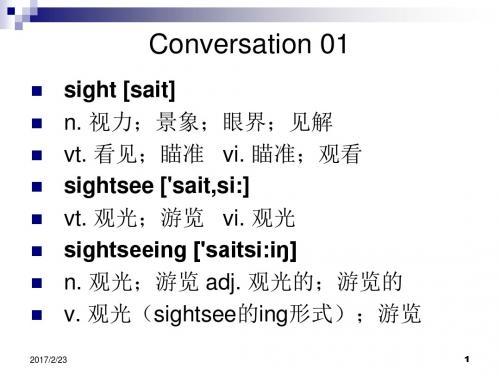
2017/2/23
29
Conversation 02
boy bad 坏的 How bad the boy is! What a bad boy ( the boy is)! He is a bad boy. interesting newspaper How interesting the newspaper is! What an interesting newspaper (it is)!
kilo- 表示’千’ Kilogram 千克 kilometer 千米
2017/2/23
34
Conversation 03
If we start early, do we have some time for .? start 开始,启程 early 副词 用来修饰start Early birds catch worms! 早起的鸟儿有虫吃! The early worms are caught by birds.
Conversation 01
I go to school. I must go to school. I must wash my clothes. You can help me. Can you help me? Must I go to school? That must be me. That is me. You must do it.
公司禁止我们入内。 The company forbid us to enter. 我们被公司禁止入内。 We are forbidden to go into the company. 有一部分动词的过去分词,可表示形容词
2017/2/23
22
Conversation 02
旅游专业英语教案17Task 7 Sightseeing(part two)
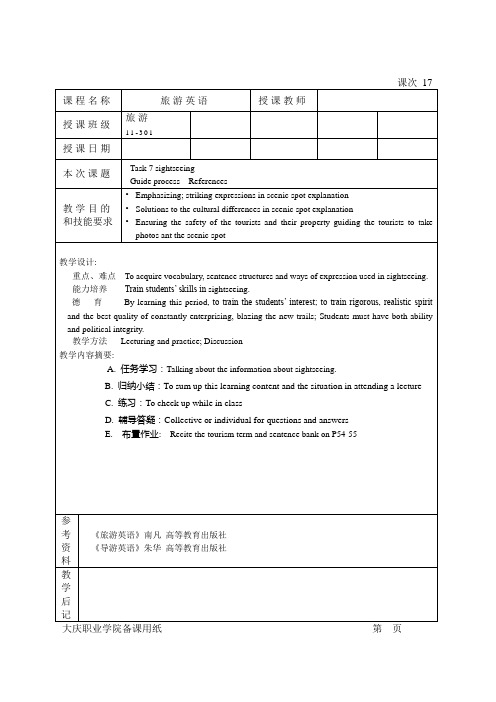
1st-2ndperiod: warming up and background information,do the reading of Text A and Text B.
3rd-4thperiod:explain new words, and phrases and expressions.Make a situational dialogue.
Difficult sentences:
a)Garden building saw its heyday during the Ming and Qing dynasties and the imperial garden Yuanmingyuan was regarded as masterpiece in the period.
能力培养Train students’ skills insightseeing.
德育By learning thisperiod, to train the students’ interest; to train rigorous, realistic spirit and the best quality of constantly enterprising, blazing the new trails; Students must have both ability and political integrity.
2. Period three and Period four:
Step one:intensive reading, understanding the important words, phrases, expressions and sentences with some examples.
sightseeing 观光出行

Unit 7 sightseeingPart I RevisionListen to the students’recording with the given topic “different means of transportation” to test students’ understanding of unit 6.Part II Travel by planeA: on plane•Would like a newspaper to read Ma’m?•No, thank you.•Would you like a newspaper to read, Sir?•Would you like a newspaper to read, Sir?•I …yeah, I’ll take the Daily Mail.•Here you go, sir.•Thank you.•It will help take my mind off things.•I am always a little nervous before flying.•Oh, well try not ot worry too much. You know, air flight is the saftes form of travel.•I am sure I’ll be better after we take off.•You know we have some flight entertainment for you too.•You will find the film guide in pocket in front of you or in flight magazine.•Oh, good.• A nice film will help me to relax.•Programs will start shortly after take off.•If there is anything I can get for you, then please just call for assistance.•When will dinner be served.•In about an hour or so.•We have fish steak and vegetarian option, which one would you like?•Fish please•Ok, I will be back later, now please try to relax and enjoy the flight.B: practice through the software in mobile phonePart III Travel by busA: how to buy ticketsFares, please!Trafalgar Square, please.I am sorry sir. I can’t change a ten-pound note. Haven’t you got any small change?I have got no small change. I am afraid.I will ask some of the passengers.Have you any small change sir?I am sorry. I have got none.I haven’t got any either.Can you change this ten-pound note, madam?I am afraid I can’t.Neither can I.I am very sorry sir. You must get off the bus, none of the passengers can change this note. They are all millionaires.Except us. I have got some small change.So have i.B: do you have ticketsDo you have a ticket?Yes I do.Your tickets please?Ok, do you have a ticket?Sorry I don’t.Do you have his ticket?No , I don’t have his ticket!What is that in your sock?Oh, it is my ticket.The new buses in London are just buses. They are not London buses. The real London buse was the old Routemaster. This was our favorite bus for 41 years. It was a design classic. Were Routemasters really dangerous? The back of the bus was an open platform with no doors. Perhaps this wasn’t very safe but Londoners like to dotheir own thing. And the Routemasters were fast in the traffic. Modern buses are safe but they are slow. Passengers hate the doors. Car dirvers hate the buses. The bus dirvers have a hard time. The first Routemasers were on our roads in 1954. The last official Routemaster jouney was on Route Number 9,on 15th February 2006. That was some years ago. Today Londoners remember the Routemaster’s name. they remember the designer’s name Douglas Scott. The new buses don’t have a name. How can we love them?Part IV travel by bikePar V teamworkPart VI SummaryPart VII Assignment。
-sightseeing观光
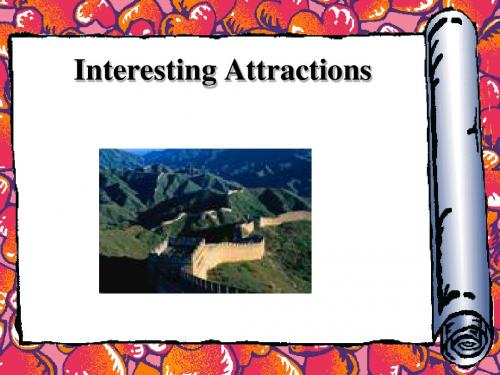
mountainFlyover来自harborNotes
• 1 in some ways 在某些 方面 • 2interesting attractions (places of interest) 名胜 • 1Which city do you think is more interesting? 你认为哪个城市更有趣 • 2In some ways I think Beijing is more interesting. • 3I hope I like Beijing as much as you do. • 4How many times have you been to Beijing?
Notes
• • • • • • 形容词比较级 More +beautiful /wonderful Bigger As much as 和 一样 Once more 再一次 For example 例如
Speak up
• • • • • • Do you like traveling by train or by plane? I think I prefer train. Where can I call a taxi? Outside the gate. What’s the best way to get around? By taxi.
Interesting Attractions
New Words
• the shopping centre the star restaurant wonderful • mountain • restaurant • flyovers • variety • relic • harbor
Star restaurant
tourism and sightseeing课件
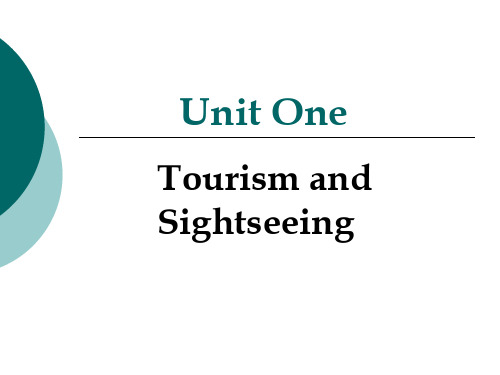
Section Two Glossary
arch artifact architectural interval lunar asymmetrical
2007年拙政园成为我国首批国家5A级旅游景区,2010年拙政
园扩大为苏州园林(拙政园、虎丘、留园)景区一起成为国家 AAAAA级旅游景区。
苏州主要园林列表:
私家园林:沧浪亭、狮子林、拙政园、留 园、网师园、艺圃、环秀山庄、耦园
佛教园林:报恩寺(北寺塔)、西园、寒 山寺、双塔、瑞光塔
王家园林:虎丘(吴王阖闾墓)、灵岩山 (吴王行宫)
2. The four famous “Buddhist Holy Mountains” in China are Mt.Wutai in _S_ha_nx_i Province, Mt. Putuo in Z_he_ji_an_g Province, Mt. Jiuhua in A_n_hu_i _ Province and Mt. Emei in _S_ich_ua_n Province.
3. Pingyao City in Shanxi Province was built during the ____ Zdhyounasty.
4. Mogao Grottoes are located 25 kilometers southwest of Dunhuang City in _G_an_su_ Province.
从北京南站直达天津的特快列车,30分钟就能到达天津站;高峰时段列车运行间隔 仅为5-6分钟。
- 1、下载文档前请自行甄别文档内容的完整性,平台不提供额外的编辑、内容补充、找答案等附加服务。
- 2、"仅部分预览"的文档,不可在线预览部分如存在完整性等问题,可反馈申请退款(可完整预览的文档不适用该条件!)。
- 3、如文档侵犯您的权益,请联系客服反馈,我们会尽快为您处理(人工客服工作时间:9:00-18:30)。
a)Garden building saw its heyday during the Ming and Qing dynasties and the imperial garden Yuanmingyuan was regarded as masterpiece in the period.
c)Traditional Chinese gardens fall into three categories, namely, imperial, private and landscape gardens.
d)Building in the garden were used for receiving guests, holding banquet, reading or writing poetry.
能力培养Train students’ skills insightseeing.
德育By learning thisperiod, to train the students’ interest; to train rigorous, realistic spirit and the best quality of constantly enterprising, blazing the new trails; Students must have both ability and political integrity.
C. teaching contents and time allotment:
1st-2ndperiod: warming up and background information,do the reading of Text A and Text B.
3rd-4thperiod:explain new words, and phrases and expressions.Make a situational dialogue.
3rd-4thperiod:Finish the excises on Page67-69.
5th--6thperiod:preview the new unit.
Notes:
Important words: component imperial masterpiece geometric subordinate heyday lattice shelter pagoda
1)Speaking skills: discuss the names ofChinesegardens.
2)Comprehensive skills:Understand thepassagein the text and on this basis, learntodescribe content of the text, and discuss about the issue.
5th--6thperiod:Do the listening andexcises.
Six teaching periods are needed to cover the whole unit, among which students will have a series of reading, listening, speaking and writing activities related to the theme of the unit.
C.练习:TБайду номын сангаас check up while in class
D.辅导答疑:Collective or individual for questions and answers
E.布置作业:Recite the tourism term and sentence bank on P54-55
参考资料
教学方法Lecturing and practice; Discussion
教学内容摘要:
A.任务学习:Talking aboutthe information aboutsightseeing.
B.归纳小结:To sum up this learning content and the situation in attending a lecture
课次17
课程名称
旅游英语
授课教师
授课班级
旅游
11-301
授课日期
本次课题
Task 7 sightseeing
Guide process References
教学目的和技能要求
•Emphasizing; striking expressions in scenic spot explanation
•Solutions to the cultural differences in scenic spot explanation
3. Period five and Period six:
Step one:check the answers of the excises
Step two: Do the listening.
1st-2ndperiod:preview the new words, phrases, and grammatical strucure.
b)Different from the classical European gardens, in which geometric patterns dominate, Chinese gardens are made to resemble natural landscapes on a smaller scale.
教学
后记
大庆职业学院备课用纸 第 页
Students will be able to:
grasp the main idea and structure of the text;
Know and remember some famous Chinese garden.
Memorize some useful expressions and translate the text.
•Ensuring the safety of the tourists and their property guiding the tourists to take photos ant the scenic spot
教学设计:
重点、难点To acquire vocabulary, sentence structures and ways of expression used insightseeing.
2. Period three and Period four:
Step one:intensive reading, understanding the important words, phrases, expressions and sentences with some examples.
Step two: make a dialogue on the basis of the situation provided in the book.
1. Period One and Period Two:
Step one: warming up.Discuss the names ofChinesegardensthey have known.
Step two:background information.
Step three: extensive reading. Ask the students to read the whole passage in 15minutes and then answer some questions
